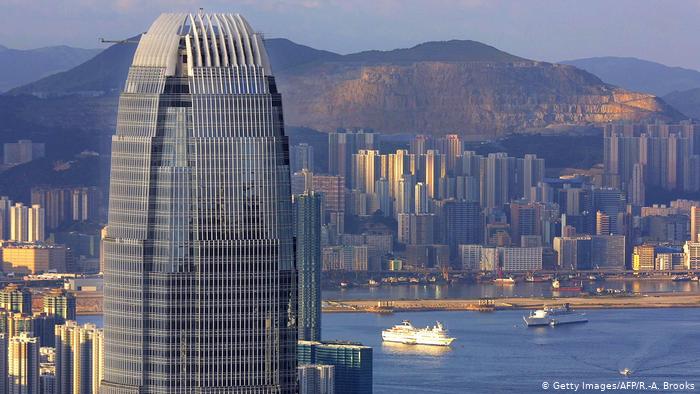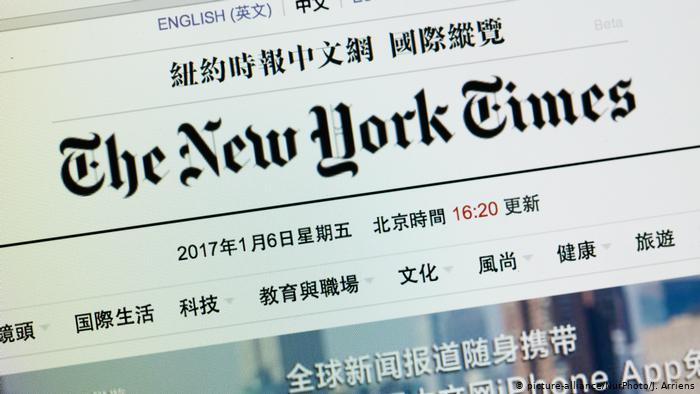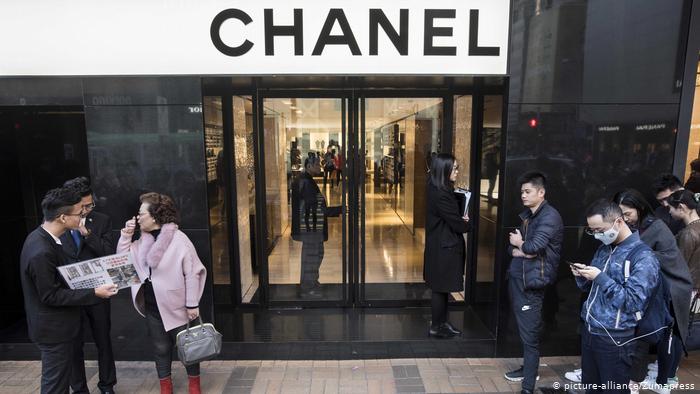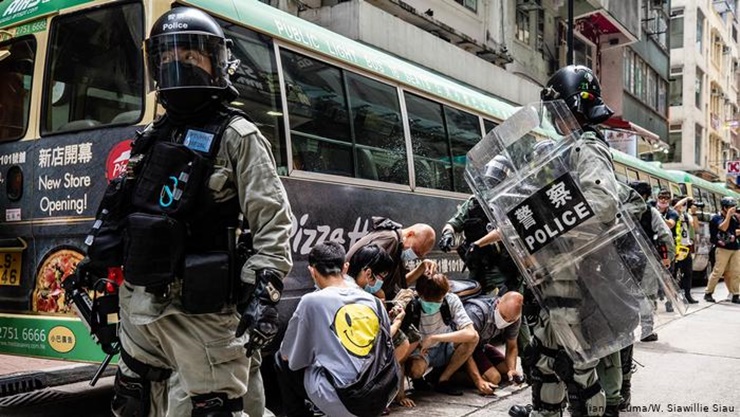After China introduced a controversial new security law, Donald Trump signed an order ending preferential economic treatment for the territory. What does Hong Kong’s economic future now hold?
Hong Kong has long been one of the world’s most freewheeling economies, revelling in laissez-faire economics and thriving on openness. It’s rebounded from crisis after crisis, but China’s controversial new security law looks set to impact all areas of the Hong Kong economy.
From now on, Hong Kong will be treated “the same as mainland China,” US President Donald Trump said as he put pen to paper on an order removing the territory’s cherished special economic status.
The US believes Beijing’s national security law undermines the freedoms Hong Kong has enjoyed since 1984, when China and Britain agreed on terms to hand Hong Kong over. Sovereignty was returned to Beijing in 1997 and a high degree of autonomy guaranteed until 2047.
“I would say the national security law, like the extradition law last year, is [making] wealthy people in Hong Kong nervous. They include local tycoons, mainland Chinese elite, and other foreigners, as similar kind of law in mainland China is often applied to charge business people over business disputes,” Ho-Fung Hung, a professor of political economy at Johns Hopkins University, told DW.
Hung believes these people will move their wealth further offshore eventually.
“Of course, in the short run, we might not see large net capital flight from Hong Kong… in the long run, the national security law will change the legal and business environment in Hong Kong for the worse,” he said.
Businesses are worried
There are signs of growing anxiety among businesses.
Companies have been criticized by China for promoting separatism and jeopardizing China’s national security, among them airlines, which have been called out for putting China/Hong Kong/Taiwan separately in their destination list. HSBC, an Asia-focused investment bank, has been accused of collaborating with US authorities for providing evidence to help in the investigation of Huawei.
“These will be indictable under the national security law now,” said Hung.
The law is certainly creating a high degree of uncertainty among the city’s tycoons, who have been the bedrock of Hong Kong’s prosperity.
Mainland Chinese social media users have launched vendettas against tycoons who they say are anti-government. Billionaire property developer Joseph Lau Luen-hung took to local media to deny allegations that he and his wife were supporters of the democracy protests.
Alvin Chau Cheok-wa, CEO of Suncity Group, a major casino junket operator in Macau, also denied he was subsidizing democracy protesters through organized criminals.
Foreigners fearful too
There are 9,000 foreign firms in Hong Kong, 1,300 of them from the United States. Political unrest in the second half of 2019 saw Hong Kong officially slip into recession. Foreign direct investment into the territory fell 47% last year to $55 billion (€48 billion).

Three quarters of American businesses operating in Hong Kong are anxious about the national security law. Their big fears are the law’s ambiguity, whether Hong Kong’s famous independent judiciary is jeopardized and whether the city’s status as an international business center is threatened.
“One of the best things about Hong Kong, one of the things that made it fantastic to do business, was that it is in the middle of everything; it’s a great city for connectivity. Now that connectivity … is not such an easy feeling anymore, especially since the national security law was passed,” Tara Joseph, president of the American Chamber of Commerce in Hong Kong, told Bloomberg.
More than one third of American businesses are planning to move capital, assets or operations outside Hong Kong, according to a poll by the chamber.
The law brings elements to Hong Kong that are familiar to anyone who has worked in mainland China, where there is a bewildering array of rules that are often arbitrarily imposed. As a journalist or a business person working in China, you know you are in breach of a rule at some point. The key is how the rules are enforced. In the meantime, there is self-censorship, little public discourse and a lack of openness.
Tech felt the impact first
Once the law was signed, observers were watching to see how it would affect the economy. Tech was the first to feel it.
While the Great Firewall of China has kept a tight muzzle on free expression in China for years, Hong Kong has always enjoyed free expression online. Until the new law, that is. Google, Facebook and Twitter have stopped processing Hong Kong government requests for user data as they review what the new law means.
Even TikTok, owned by Chinese internet giant Byte Dance but not available in mainland China, has withdrawn its app from Hong Kong stores and made the app inoperable to current users.

While not directly impacting the economy, news that The New York Times is moving the digital team from its Hong Kong bureau to Seoul, Korea is sure to add to growing downbeat sentiment. The American outlet’s digital team accounts for about one third of its Hong Kong bureau. China recently ejected the newspaper’s Beijing correspondents amid worsening relations with the US.
Foreign policy on emigration
Will Hong Kongers vote with their feet? A survey by Foreign Policy magazine of 890 Hong Kong citizens showed that around half have considered emigrating from Hong Kong because of the law.
The first choice for nearly one third of the respondents was Hong Kong’s democratic neighbor, Taiwan, which has long been in a systemic struggle with Beijing and has opened a new office to help fleeing Hong Kongers.
Even though UK Prime Minister Boris Johnson has offered some three million people from Hong Kongto come to Britain and apply for citizenship, just 10% of those interested in emigrating ranked Britain as their first choice. Canada and Australia were viewed as more suitable destinations.
Luxury in crisis
For years Hong Kong has been Asia’s capital for luxury shopping, but it has been decimated by a succession of events, from the democracy demonstrations last year to COVID-19 and now the new security law.

China’s luxury market is recovering from the coronavirus pandemic but shoppers are not looking at Hong Kong. Instead the retail sector is facing growing competition from the mainland.
Some 90% of all growth in global luxury sales last year came from China, according to research by the Bain consultancy. Brands like Louis Vuitton, Gucci, Cartier, Chanel and Dior saw sales increase by 40-90% in early June.
Consultancy McKinsey puts China’s middle class at about 550 million people, a staggering number and more than the entire population of the US. China still trails the US in terms of purchasing power per capita, but it is clearly in expansion mode.
Financial sector unworried
The financial services sector is likely to do well. While Hong Kong’s position as a gateway to Asia may be supplanted by places like Singapore or even Taipei, its role as a way into China stands strengthened.
The US is tightening the screws on foreign companies listed in New York, which have long enjoyed less scrutiny than domestic listed stocks. Chinese companies are turning to the Hong Kong market after the US Senate tightened rules for mainland companies.
Yum China, the operator of Pizza Hut and KFC on the mainland, has filed for a $2 billion listing in Hong Kong while Alibaba’s delivery unit ZTO Express is also mulling selling shares in the territory.
They will join Alibaba Group Holding, game developer NetEase and online retailer JD.com on the Hong Kong Stock Exchange. They have raised a cumulative $20 billion through secondary listings in Hong Kong since November last year.
In an article in the Harvard Business Review, J. Stewart Black and Allen J. Morrison said recent developments in Hong Kong pose significant threats to foreign firms operating there. Much depends on why foreign firms are in Hong Kong — is it just for the Hong Kong market, for China’s markets or for Asia as a whole?
While believing that companies should take care to secure their people, consider potential scenarios and create options in the event a major move is required, they are overall optimistic.
“And at the end of the day, China is still very dependent on Hong Kong for trade, foreign direct investment, equity and debt capital, and foreign exchange — and that self-interest should keep its leaders from going too far with implementing the security law,” the authors wrote.
We have been here before with sanctions. Washington imposed sanctions on China after the bloody crackdown on the Tiananmen Square democracy protests in 1989. Within a few years, many of those had been lifted. Then leader Deng Xiaoping supposedly said at the time: “The West always forgets.”
DW / Balkantimes.press
Napomena o autorskim pravima: Dozvoljeno preuzimanje sadržaja isključivo uz navođenje linka prema stranici našeg portala sa koje je sadržaj preuzet. Stavovi izraženi u ovom tekstu autorovi su i ne odražavaju nužno uredničku politiku The Balkantimes Press.
Copyright Notice: It is allowed to download the content only by providing a link to the page of our portal from which the content was downloaded. The views expressed in this text are those of the authors and do not necessarily reflect the editorial policies of The Balkantimes Press.

